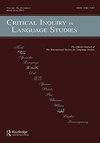Nationalism, nationalized cultures, and English Language Teaching (ELT): what teacher interviews reveal about culture teaching as vehicle for ideological reproduction/transformation
引用次数: 3
Abstract
ABSTRACT This study explores the interplay of nationalism and English Language Teaching (ELT) classroom practices, as reported in 11 interviews with ELT educators in various locations (e.g., United States, Serbia, France, and Saudi Arabia). The study approach is informed by theories of discursive nationalism which interpret nations and nationalized things (e.g., nationalized cultures) as social constructions maintained and managed through discourse. Qualitative analysis of interview data identified teacher-reported practices reflective of national reproduction (e.g., analogy-making and neutral stance-taking) and of national transformation (e.g., recasting nationalized things to global levels and engaging students with cultural and linguistic diversity within an otherwise coherent nationalized culture). The data reporting national reproduction are consistent with the existing literature, and the teacher reports of national transformation offer something new to the existing literature on nationalism in ELT. The analysis further highlighted teacher-reported use of assimilation/dissimilation discursive strategies in representing nationalized things to their students. The study findings contribute to a comprehensive understanding of how the ideology of nationalism intersects with ELT classroom practices. Such an understanding is valuable to the critical project of raising teacher sensitivity to the implications national representations have for social relations of power and privilege outside the classroom.民族主义、民族化文化与英语教学(ELT):教师访谈揭示了文化教学作为意识形态复制/转化的载体
摘要本研究通过对美国、塞尔维亚、法国和沙特阿拉伯等地英语教学工作者的11次访谈,探讨了民族主义与英语教学课堂实践的相互作用。该研究方法以话语民族主义理论为基础,这些理论将国家和民族化的事物(如民族化的文化)解释为通过话语维护和管理的社会建构。对访谈数据的定性分析确定了教师报告的反映国家再生产(例如,类比和中立立场)和国家转型(例如,将国有化的东西重塑到全球水平,并让学生在其他连贯的国有化文化中融入文化和语言多样性)的做法。报告民族再生产的数据与现有文献一致,教师关于民族转型的报告为现有关于英语教学中民族主义的文献提供了新的内容。该分析进一步强调了教师报告的在向学生代表民族化事物时使用同化/异化话语策略的情况。研究结果有助于全面理解民族主义意识形态如何与英语教学课堂实践相交叉。这种理解对于提高教师对国家代表性对课堂外权力和特权社会关系的影响的敏感性这一关键项目很有价值。
本文章由计算机程序翻译,如有差异,请以英文原文为准。
求助全文
约1分钟内获得全文
求助全文
来源期刊

Critical Inquiry in Language Studies
Arts and Humanities-Language and Linguistics
CiteScore
5.30
自引率
0.00%
发文量
23
 求助内容:
求助内容: 应助结果提醒方式:
应助结果提醒方式:


